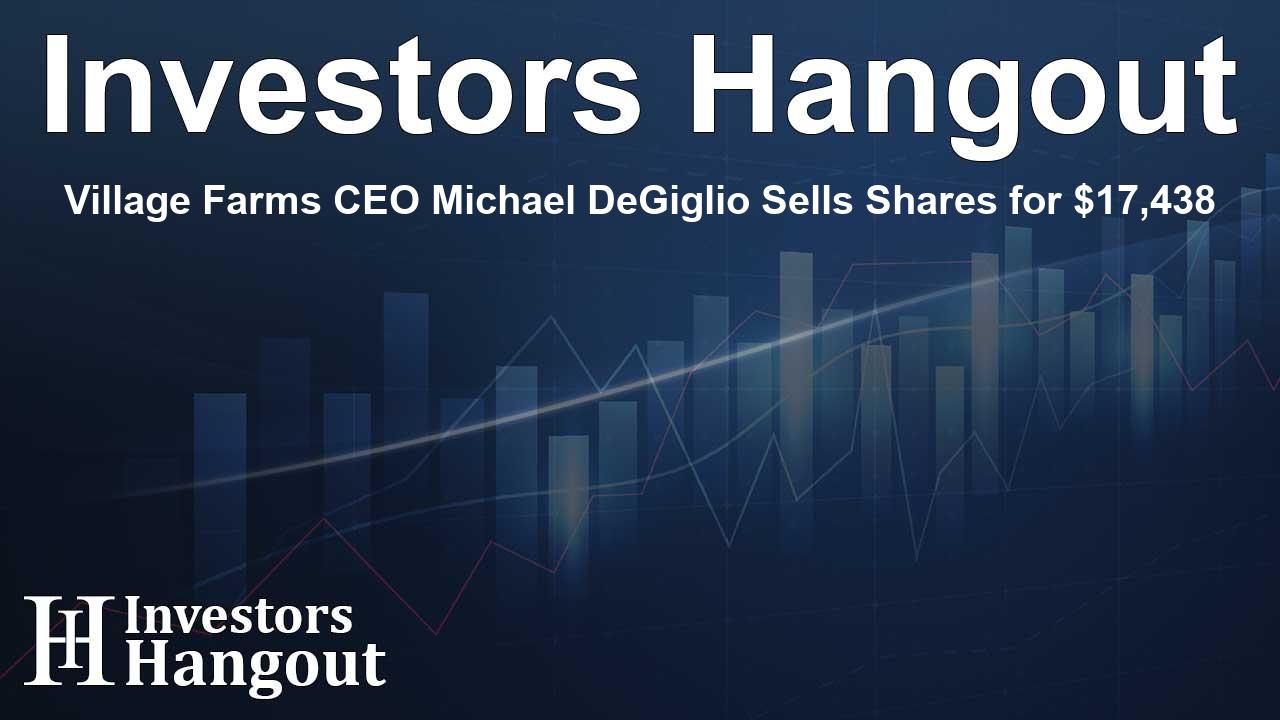Village Farms CEO Michael DeGiglio Sells Shares for $17,438

Village Farms CEO Shares Insights on Recent Stock Sale
Village Farms International, Inc. (NASDAQ: VFF) has recently been in the spotlight following the share sale by its CEO, Michael A. DeGiglio. This move is particularly significant as it reflects a strategic decision amidst the company's evolving financial landscape. DeGiglio sold 17,579 common shares, valued at approximately $17,438, at a weighted average price of $0.992 per share, a transaction filed with the Securities and Exchange Commission.
Analyzing the Stock Sale Context
The recent stock sale by DeGiglio is noteworthy, especially as he retains a substantial stake in the company, with 9,673,239 shares still in his possession. These types of transactions are closely watched by investors and analysts alike, as they can signal the confidence levels of corporate leaders in their company's future performance.
Understanding Executive Share Sales
It is common for company executives to sell shares for various reasons, including personal financial management and portfolio diversification. Such sales often occur in a structured manner through open market transactions. Therefore, while insider sales might raise eyebrows, they don't necessarily provide a clear-cut indication of an executive's outlook towards the company's prospects.
Village Farms Financial Performance Overview
As investors assess the implications of the share sale, it's essential to consider the broader financial picture of Village Farms. The company has announced a striking performance in its second quarter, showcasing a significant year-over-year increase of 45% in total net sales, amounting to $56 million. This growth can largely be attributed to advancements in the Canadian cannabis sector and the fresh produce market. However, despite this growth, the company faced a net loss of $23.5 million and a negative EBITDA of $3.6 million.
The Canadian Cannabis Sector's Role
The Canadian cannabis market has played a pivotal role in Village Farms' recent performance, achieving a record in branded retail sales with a 35% increase. The company also enjoyed a 7% rise in fresh produce sales, totaling $47 million. With aspirations to enhance its cannabis cultivation capacities further, Village Farms is focused on capitalizing on opportunities in both the Canadian and EU markets.
CEO's Contract and Future Outlook
In an exciting development, Village Farms has extended Michael A. DeGiglio's contract until August 15, 2027. This contract stipulates a minimum annual base salary of $1,022,880, with provisions for potential increases. The agreement also aligns with the company's clawback policy and incorporates standard protective clauses.
Investors’ Perspectives on Company Valuation
Despite the current momentum, some financial metrics present challenges. As reported, Village Farms has a Price/Book ratio of 0.4, hinting at a potential undervaluation relative to its book value over the past twelve months leading to the second quarter of 2024. Moreover, while the revenue growth stands at an impressive 11.2%, the gross profit margin remains low at 17.04%, indicating that profitability may continue to be a hurdle for the company.
Conclusion and Moving Forward
Investors should stay vigilant and monitor Village Farms closely, especially as it navigates through its evolving financial landscape and the implications of insider transactions. With the CEO's recent stock sale, it remains crucial for stakeholders to track future earnings reports and management discussions to decipher the company's strategy and growth potential. As Village Farms continues to adapt to a competitive market, its commitment to leveraging its Canadian and EU cannabis sectors could pave the way for future success.
Frequently Asked Questions
Why did the CEO of Village Farms sell shares?
The CEO, Michael A. DeGiglio, sold shares as part of standard practice for managing personal financial portfolios and diversification purposes.
What does the recent sale mean for investors?
While CEO share sales can raise questions, they do not necessarily imply negative sentiments towards the company's future; it’s essential to analyze the broader context.
How did Village Farms perform financially?
Village Farms reported a 45% increase in net sales but faced a net loss of $23.5 million, showcasing mixed financial results.
What is Village Farms' primary business focus?
Village Farms focuses on agricultural production and crop-related operations, particularly in the Canadian cannabis and fresh produce markets.
What is the future outlook for Village Farms?
With ongoing expansion in the cannabis sector and a recent contract extension for the CEO, Village Farms is positioned for potential growth, but challenges remain.
About Investors Hangout
Investors Hangout is a leading online stock forum for financial discussion and learning, offering a wide range of free tools and resources. It draws in traders of all levels, who exchange market knowledge, investigate trading tactics, and keep an eye on industry developments in real time. Featuring financial articles, stock message boards, quotes, charts, company profiles, and live news updates. Through cooperative learning and a wealth of informational resources, it helps users from novices creating their first portfolios to experts honing their techniques. Join Investors Hangout today: https://investorshangout.com/
Disclaimer: The content of this article is solely for general informational purposes only; it does not represent legal, financial, or investment advice. Investors Hangout does not offer financial advice; the author is not a licensed financial advisor. Consult a qualified advisor before making any financial or investment decisions based on this article. The author's interpretation of publicly available data shapes the opinions presented here; as a result, they should not be taken as advice to purchase, sell, or hold any securities mentioned or any other investments. The author does not guarantee the accuracy, completeness, or timeliness of any material, providing it "as is." Information and market conditions may change; past performance is not indicative of future outcomes. If any of the material offered here is inaccurate, please contact us for corrections.